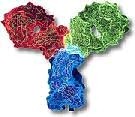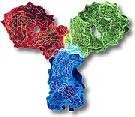ADC Bio wins development grant for new ADC production tech

The £450,000 (€531,000) award - from the Welsh Government, finance Wales, the local council and private investors – will support development of a ‘lock and release’ production method, which minimises processing steps according to company spokesman Dave Evans.
Evans told in-Pharmatechnologist.com that: “Existing ADC conjugation methods are performed in solution at high dilution. Our technology differs in that the antibody is locked onto the solid support.
“The drug, typically a cytotoxin or an ultra-potent toxin, binds to the antibody whilst it is immobilised on the solid support to form the resultant ADC. After assembly all superfluous reagents are simply washed away from the immobilised ADC.
“The ADC may then be released from the solid support. The structural integrity and the binding activity of the antibody are maintained throughout our Lock-Release process.”
Ab protection
The other main advantage over current ADC production methods – according to CEO Charlie Johnson – is that the antibody is protected throughout the production process and cannot be lost through leakages, ruptures or equipment failure.
“Given the intrinsic value of the antibody and drug components involved, our technology offers a significant degree of risk management throughout the conjugation process and subsequently during storage and shipping of the naked antibody and ADC.”
ADC Bio also claims that immobilising antibodies improves production yields – which can be as low as 30 per cent for solution-based production methods - by minimising the likelihood of aggregate formation, which can be a particular problem feature of ADCs using very hydrophobic drug payloads.
“In the immobilised format the antibodies remain separated from each other during the critical conjugation phase, which means much reduced risk of aggregation,” Johnson explained, adding that “we likewise anticipate that significant process intensification for commercial ADC production can be achieved via increasing the effective volume concentration through immobilisation.”
ADC Bio, which expects to begin trialling commercial-scale production in the next 18 months, plans to license the technology to CMOs and drug makers alike, although the company does have R&D conjugation facilities based at St Asaph, North Wales.








